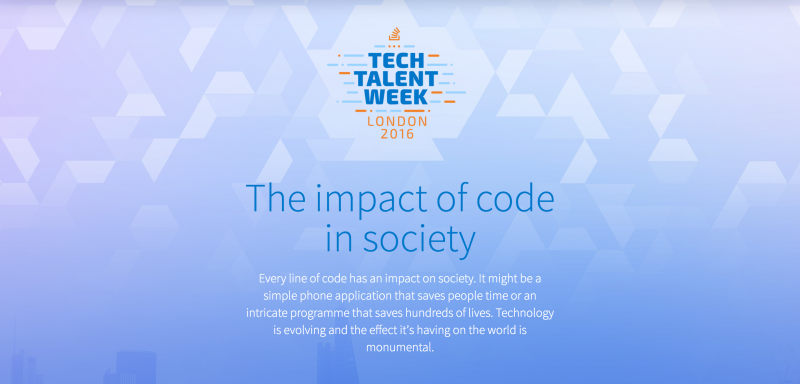The impact of code in society
Writeup of a special event in London

Yesterday I took part to a special meeting, organised by Stack Overflow and sponsored by Badoo, in occasion of the Tech Talent Week London. The title of the event was The Impact of Code in Society and gathered four great speakers sharing their experiences and point of views on how the software – and the “code” industry – impacted out society.
Here a (small) writeup of the talks:
Joel Spolsky, Founder of Stack Overflow
Metaphor of the disappearing taxi.
Programming is hard. We all know it.
Dealing with computer is like talking to a insane trash bin.
A lot of questions have been already a response online.
We invented Stackoverflow to get rid of XpertsExchange :)
Software is more and more “infusing” our life. And every hour you spend, you interact with millions of lines of code written by some developer somewhere in the world.
We consider it a given, but think about 10/20 years ago or more, how many chances you had to interact with a software program.
Now software programs are starting to boss us.
We were always been told that computer are input-output devices. Amazon workers are output devices. Call-centers operators are input devices.
Facebook algorithms, that decide what to show on our feeds, are written by developers.
And they can’t be neutral: whatever they do they are manipulating and making a choice on what to show and what to hide to us.
The new emojii have been created to have better signals for their algorithms, to improve them using more data points that not only “Like” or nothing.
Rian Liebenberg, CTO at Schibsted Media Group
Advertising, the era of Mad Men, 1950s.
The Television era, 1980s.
The Google and “Ads” era, 2000s.
Explanation of how an advertising platform works (identifying, serving, bidding, etc.)
Is it actually tracking and surveillance? For what? Essentially pretty rubbish ads. Is this all that we can come out with?
We are selling our behaviour as commodity, to get the content.
“If you have an Instagram account, you can slap a tag on anything, take a picture of it, and sell it”. Even a sheep.
Bryan Dove, SVP Engineering at Skyscanner
Code has changed and impacted the society. Think what happened to:
– learning: Wikipedia, other languages, democratisation of knowledge
– transportation: not only Uber but autonomous driving
– pocket supercomputer
– ‘being there’ to share experiences (Skype, FaceTime) and connect with people you love
So, why travel is so hard?
– for travel actually the web is a GUI shim in front of old mainframes
– systems crunch billions of possible combinations and permutations
How do we leverage information and data to reduce the cognitive load of booking a flight, a trip, an hotel stay, an entire holiday?
This is what we do with Skyscanner. Our company: 30 languages, 780 staff, 50 nationalities, 10 offices
We want to make buying a trip online as easy as buying a book online.
Apps are hard: 66% downloads no new apps; 55% drop-off during first use; -77% user loss within 3 days; -95% average loss within 9 days.
Amazon Echo app for Skyscanner / Conversational UI.
Text chat to book a flight / bot.
Amali de Alwis, CEO at Code First: Girls
CFG is a social enterprise which exist to get more women into tech.
Skills/Courses + Community + Consulting
% of women in tech roles is too low
why does that matter? we need an other 1 million workers in the digital economy.
some really astonishing people that achieved incredible results through CFG. girls that up to three years ago have never written a line of code, and now work at NASA as system engineer.
these people have changed their lives, from a life in which technology was not present to jobs that heavily involves tech
how to achieve this? look at your policies on recruiting and retention.
what should companies consider?
– community and open source
– personal networks
– continued learning
Link: http://business.stackoverflow.com/ttwl-2016/the-impact-of-code-in-society